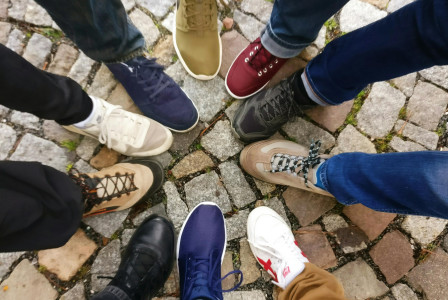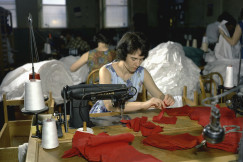Best practices
05 June 2025
VEJA: Transforming the Social Dimension of Footwear Manufacturing
Best practices
05 June 2025
Social dimension
Sustainable competitiveness
Textile
+2 more
Login / create an account to be able to react
-
137

VEJA revolutionizes footwear manufacturing through comprehensive social responsibility across its entire value chain. The French sneaker brand sources organic cotton and rubber directly from Brazilian and Peruvian communities, offering market-decorrelated prices and pre-financing up to 50% of harvests. Manufacturing adheres to enhanced labour standards with annual social audits. VEJA employs vulnerable populations in logistics operations, helping socially excluded individuals secure employment. This integrated approach demonstrates that ethical practices and commercial success can coexist, establishing VEJA as a blueprint for industry transformation.
VEJA
Topics
France
Academic / Research and VET Institutions
Business Support Organisation
Company with 250 or more employees
Cluster Organisations
Consumer Organisations
Cultural and Heritage Organisations
Destination Management & Marketing Organisations
EU Institutions
Financial Institutions and Investors
Industry Associations and Chambers of Commerce
International Organisations
Local Authorities
Media / Journalist Organisations
National authorities
Networks and Federations / Confederations
NGOs / Non-profits
Notified Bodies
Regional Authorities
SMEs (a company with less than 250 employees)
Social Economy Entity
Trade Unions
Other
-
Transition Pathway's building blocks
-
-
Social dimension
-
Sustainable competitiveness
-
-
Industrial ecosystems
-
-
Textile
-
-
Textiles ecosystem areas
-
-
Fibres, yarns and fabrics
-
Footwear
-
Share
Founded in 2005, VEJA has challenged traditional footwear production models by embedding social and environmental values at the heart of its operations. What sets VEJA apart is its long-term commitment to reshaping not only what shoes are made of, but how and by whom they are made.
The French sneaker brand has reimagined what it means to operate responsibly in the footwear sector, creating a comprehensive model that prioritizes social equity from raw material sourcing to final delivery.
Redefining Supply Chain Ethics Through Direct Partnerships
VEJA's attention for the social dimension starts at the very foundation of its supply chain. VEJA has built direct relationships with producer communities across Brazil and Peru.
The company sources organic cotton directly from farmer associations in Brazil's Northeast region and wild rubber from Amazonian communities. Rather than subjecting these producers to volatile market prices, VEJA establishes yearly contracts at the beginning of each production cycle, guaranteeing purchase commitments that allow small-scale farmers to plan sustainably. By setting mutually agreed prices in advance, VEJA creates predictable income streams and ensures that producer families can maintain decent living standards. The company pre-finances up to 50% of each harvest, providing crucial capital that enables producers to invest in their operations.
In 2019, VEJA’s rubber has obtained the “Fair for Life” certification, a standard that guarantees long-term direct trade relationships, fair prices, good working conditions, and the prohibition of forced labour.
Manufacturing with Dignity and Transparency
VEJA's commitment to social responsibility continues through its manufacturing processes. The company produces its sneakers in Brazilian factories and workshops that adhere to International Labour Organization standards. it requires that workers enjoy fair wages, reasonable hours, union representation, and benefits like paid vacation. Annual social audits ensure ongoing compliance with these standards, with results made publicly available in a demonstration of transparency. When areas for improvement are identified, VEJA works collaboratively with manufacturing partners to implement corrective action plans. Since 2023, VEJA has expanded production to Portugal, extending its ethical manufacturing model to European operations.
Logistics and Social Integration
Since 2004, the company has deliberately chosen to entrust its warehousing and distribution to vulnerable populations, including disabled individuals and those facing social exclusion. In France, VEJA partners with Atelier Sans Frontières, a non-profit organization focused on reintegrating socially excluded individuals into the workforce.
More recently, VEJA has expanded this model through its partnership with Log'ins (Logistics & Insertion), an organisation specializing in employing individuals with disabilities while supporting their social integration. Since 2020, this initiative has helped more than 380 people secure employment and stable situations after working in VEJA's logistics operations.
Setting New Standards for Corporate Responsibility
VEJA offers detailed information on its supply chains, materials, prices, and audits. This openness enables consumers, investors, and industry peers to evaluate the company's claims and holds VEJA ac countable to its stated values. VEJA sets an example of radical transparency for companies seeking to align their operations with evolving social expectations.
A Blueprint for Industry Transformation
VEJA's comprehensive approach to social responsibility across its entire value chain offers a compelling blueprint for transformation within the footwear and broader fashion industries. VEJA's model suggests that integrating social responsibility into core business operations can create competitive advantages through enhanced brand loyalty, supply chain resilience, and access to conscious consumers.
Comments (0)
See also
BALI Chair: Multi-stakeholder collaboration as a driver of systemic change
- Categories
- R&I, techniques and technological solutions Skills Social dimension +9 more
Breaking the silence: how data is transforming gender equality in textile factories
- Categories
- Sustainable competitiveness Regulation and public governance Textile +11 more
The Discover Natural Fibres Initiative: a model for textile industry collaboration
- Categories
- Infrastructure Investments and funding R&I, techniques and technological solutions +6 more




